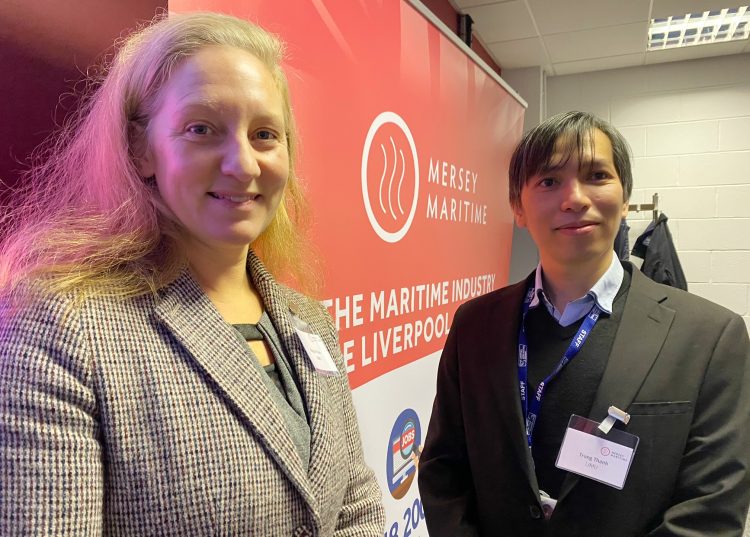
LJMU marks two centuries of engineering expertise
Liverpool John Moores University (LJMU) is pushing forward with a number of world-leading maritime research projects as it gets set to celebrate its 200th anniversary. Tony McDonough reports

In a presentation to a packed Face-2-Face networking session at Mersey Maritime in Birkenhead, a team from LJMU outlined the breadth and depth of the institution’s work with the maritime sector across the world.
Called LJMU 200 years of history and heritage – looking back and navigating the future, the presentation was led by Dr Robyn Pyne from LJMU’s School of Engineering.
LJMU first came into being in 1823 as the Liverpool Mechanics Institute. In 1852 it opened its Nautical School and College, reflecting Liverpool’s status in the 19th century as one of the world’s leading ports.
It was later known as Liverpool Polytechnic before transforming into Liverpool John Moores University in 1992. Sir John Moores was one of Liverpool’s leading business people and philanthropists.
“The Liverpool Mechanics Institute was very much an institution for education for Liverpool, responding to the need for formal education for mechanics,” said Dr Pyne.”Emerging from that was the marine specialisation.
“We don’t deliver courses in the same way. We don’t deliver courses for seafarers only now, we tend to focus on research. As we are celebrating our bicentenary next year we are also celebrating the contribution we have made.
“Not just to the Liverpool city region but also globally. Today, LJMU offers BEng and MEng programmes in Mechanical Engineering, and Marine and Mechanical Engineering, BSc (top-up) programmes in Maritime Business and Management and Nautical Science, and MSc programmes in Marine and Offshore Engineering, Maritime Operations Management, Port Management, and International Transport, Trade and Logistics.
“Unlike quite a lot of maritime subject areas in universities, which have migrated their way across to business schools, we are still married to those mechanical engineers.
READ MORE: Mersey Maritime reveals awards shortlist
READ MORE: Liverpool city region sets £11.8bn export target
“We have a number of specialisations – electrical engineering, logistics and maritime management, nautical science and mechanical engineering and marine and mechanical engineering.
“We are able to carry out in-depth multi-disciplinary research and put together very strong research teams. This means we can punch a little bit above our weight in comparison to other former polytechnics. We work with industry regionally and internationally.”
Dr Pyne is also the principal investigator in the Skillsea project which focuses on current and future skills in the maritime sector. This started in 2018 and runs until June 2023 and includes 27 partners across eight countries.
“It looks at skills for seafarers, marine engineers and navigators,” she explained. “We are now seeing a rapid rate of change that we have not seen before. I am working closely with other partners to identify future skills gaps.”
Next up to speak was Professor Trung Thanh Nguyen. He is a Professor of Operational Research in Transportation and a co-director of the Liverpool Logistics, Offshore and Marine (LOOM) Research Institute.
He outlined a number of research projects that have made, and are making, a tangible difference to maritime operations in the UK and overseas. Prof Nguyen said: “We provide digital innovation solutions to businesses to help them become more efficient and profitable.”
Prior to the opening of the giant Liverpool2 container terminal at the Port of Liverpool, he and his team ran simulation scenarios using different equipment and technologoes to look at different ways in which the facility could operate.
They also worked with port owner Peel Ports on examining how vessels move in and out of the lock system in the docks. Because the older part of the port operates in shallower waters, analysing the impact of the tides on vessel movement becomes very important.
Using satellite data they developed an algorithm to improve the efficiency of vessel comings and goings.

Traffic congestion around the port, and in the Liverpool to Manchester corridor, is also an area of research. The team has developed a digital platform with access to over 100 sensors at locations across Liverpool city region to monitor traffic and air quality.
Other projects include a collaboration with container ship giant ACL on looking at optimal routes for its vessels and the team has also worked with ports internationally including Dublin Ferryport (Dublin) and Port of Radicatel (Le Havre).
Dr Pyne then talked about the work of PhD Fellow at the School of Engineering, Hazel Sivori, and how she is looking at the “functional integration” of people and technology in the maritime sector.
She then introduced another speaker, LJMU researcher Xinrui Liang. Xinrui asked those present to take part in a research study into the eight English Freeports currently being established, including one in the Liverpool City Region.
Her study will carry out an assessment on the sustainability of the Freeports. She has devised 43 key indicators that cover economic, environmental and social aspects of the developments.
To round off the session, Professor Jin Wang, director of Liverpool Logistics, Offshore and Marine (LOOM) Research Institute, spoke on video about the wide international respect and recognition LJMU had gained due to its world class research.
A link to Xinrui Liang’s research study survey can be found here: https://ljmu.onlinesurveys.ac.uk/key-performance-indicators-for-freeport-sustainability-ass-3
